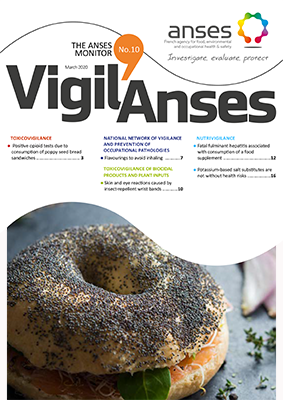Issue 10 OF VIGIL'ANSES
Editorial

Over-the-counter food supplements are becoming increasingly popular in France, even though some of them contain substances that may pose a major health risk. Even when they are banned in our country, they remain available on the internet. Others, although authorised, may nevertheless be dangerous for some people, who may not even be aware of the risk.
This first 2020 issue of Vigil'Anses therefore presents a case of fatal hepatitis that occurred following the intake of a food supplement for weight loss, Slim Metabol®, which contains Garcinia Cambogia, a plant most likely responsible for the product's toxicity.
The potassium salts used as a substitute for table salt in sodium "salt-free" diets can be sold over the counter, yet can be hazardous in some situations. ANSES reiterates the importance of seeking medical advice before using these products, as low-salt diets are often indicated for people for whom potassium salts can lead to hyperkalaemia and heart problems.
Another article in this issue looks back at an alert issued a year ago about an abnormally high level of opioids found in sandwiches made from poppy seed bread, which resulted in positive screening tests for commercial drivers. It presents the findings of the investigations carried out and an update on the regulations in this area.
When you want to protect your children from insect bites, the last thing you expect is for their skin to be burned by the liquid in the mosquito-repellent wrist band you put on them. Based on a study of cases reported to poison control centres, we provide an update on these devices and the hazards to which they expose younger children.
Lastly, the final article in this issue explains the hazards to food-processing workers of certain flavourings inhaled during manufacturing. While severe respiratory diseases were initially described in the United States in contexts of high exposure, less pronounced forms have also been observed in France, and reported to the National Network for Monitoring and Prevention of Occupational Diseases (RNV3P). This has led to a call for preventive measures to be reinforced.

